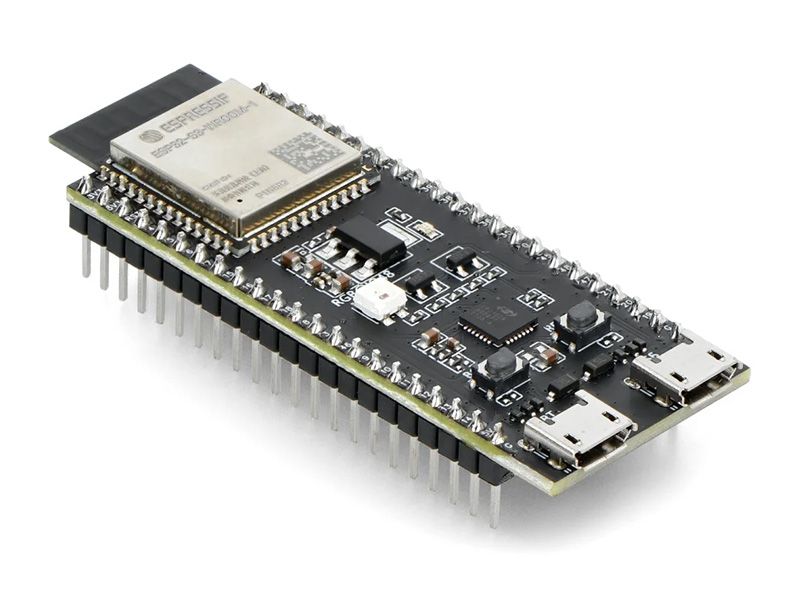ESP32-S2-DevKitC-1-N8R2
by Espressif

ESP32-S2-DevKitC-1 is an entry-level development board based on ESP32-S2-SOLO (on-board PCB antenna) or ESP32-S2-SOLO-U (external antenna connector), which are two general-purpose modules with a 4 MB SPI flash. This board integrates complete Wi-Fi functions.
Most of the I/O pins are broken out to the pin headers on both sides for easy interfacing. Developers can either connect peripherals with jumper wires or mount ESP32-S2-DevKitC-1 on a breadboard.
Purchase
Contribute
Have some info to add for this board? Edit the source for this page here.
CircuitPython 9.2.1
This is the latest stable release of CircuitPython that will work with the ESP32-S2-DevKitC-1-N8R2.
Use this release if you are new to CircuitPython.
Built-in modules available: _asyncio, _eve, _pixelmap, adafruit_bus_device, adafruit_pixelbuf, aesio, alarm, analogbufio, analogio, array, atexit, audiobusio, audiocore, audiomixer, audiomp3, binascii, bitbangio, bitmapfilter, bitmaptools, board, builtins, builtins.pow3, busdisplay, busio, busio.SPI, busio.UART, canio, codeop, collections, countio, digitalio, displayio, dualbank, epaperdisplay, errno, espcamera, espidf, espnow, espulp, fontio, fourwire, framebufferio, frequencyio, getpass, gifio, hashlib, i2cdisplaybus, io, ipaddress, jpegio, json, keypad, keypad.KeyMatrix, keypad.Keys, keypad.ShiftRegisterKeys, keypad_demux, keypad_demux.DemuxKeyMatrix, locale, math, max3421e, mdns, memorymap, microcontroller, msgpack, neopixel_write, nvm, onewireio, os, os.getenv, paralleldisplaybus, ps2io, pulseio, pwmio, qrio, rainbowio, random, re, rgbmatrix, rotaryio, rtc, sdcardio, select, sharpdisplay, socketpool, socketpool.socketpool.AF_INET6, ssl, storage, struct, supervisor, synthio, sys, terminalio, time, touchio, traceback, ulab, usb, usb_cdc, usb_hid, usb_midi, vectorio, warnings, watchdog, wifi, zlib
Features: Wi-Fi, Bluetooth/BTLE, Breadboard-Friendly
Absolute Newest
Every time we commit new code to CircuitPython we automatically build binaries for each board and language. The binaries are stored on Amazon S3, organized by board, and then by language. These releases are even newer than the development release listed above. Try them if you want the absolute latest and are feeling daring or want to see if a problem has been fixed.
Previous Versions of CircuitPython
All previous releases of CircuitPython are available for download from Amazon S3 through the button below. For very old releases, look in the OLD/ folder for each board. Release notes for each release are available at GitHub button below.
Older releases are useful for testing if you something appears to be broken in a newer release but used to work, or if you have older code that depends on features only available in an older release. Otherwise we recommend using the latest stable release.
